Are you looking to create a healthcare app?
The healthcare industry is easily one of the largest ones and combines it with tech; you get the healthcare mobile app.
With the sudden arrival of the coronavirus pandemic, the industry boasted even more. The reason being skyrocketing innovation and good customer response made this a multi-billion dollar industry.
Now, if you want to develop a healthcare app of your own, you must have a few questions. This is why you are on this blog to find answers related to healthcare app development and various aspects related to it shall be discussed.
This step-by-step Guide to Build a Healthcare App is the one-stop solution that you need.
Let’s start without any further ado.
Overview of the Healthcare App Market
The market overview gives insight into any market about important aspects such as user behavior, market trends, and much more.
This is why we emphasized sharing the market stats.
![Mhealth Apps Market Size, 2021 to 2030 [USA Billion]](https://www.nimbleappgenie.com/blogs/wp-content/uploads/2022/05/Mhealth-Apps-Market-Size-2021-to-2030-USA-Billion.webp) As per the report, the global mHealth apps market is likely to grow from $40.2 billion in 2021 to $340.5 billion by 2030. With that being said, the market will grow at a CAGR of 26.79% during the forecast period.
As per the report, the global mHealth apps market is likely to grow from $40.2 billion in 2021 to $340.5 billion by 2030. With that being said, the market will grow at a CAGR of 26.79% during the forecast period.
- U.S. mHealth market booming: it is expected to reach $86.15 billion by 2032 (11.4% annual growth).
- Global mHealth market is divided into regions: North America, Europe, Asia Pacific, and others.
- North America leads due to strong healthcare infrastructure and technological advancements.
As we discussed the stats, let’s talk about the next important question which is:
Why Should You Develop a Healthcare App?
So, why should you develop a healthcare app of your own? First, let’s be clear what it is?
A healthcare mobile app or mHealth app can be considered an umbrella term. It delivers conventional healthcare-related services via an app to patients.
Post-pandemic, many of us have some kind of mHealth app on our phones. These apps offer a variety of features such as patient-facing features and healthcare provider-faring features. That’s for later. But, this is the answer to what?
As far as why is concerned, the reason to develop a healthcare app is mentioned below:
1. Future of Healthcare
One of the main reasons you should create a healthcare app is because this is the future of the healthcare industry.
It goes without saying that every industry will leverage technology in its operations and it’s not like we haven’t seen the spike in mHealth apps.
With its proven benefits to users, the demand will grow even more. So, developing a healthcare app is a smart move.
2. Customer Demand
One of the easiest formulas to make millions or even billions of dollars in the market is to deliver what customer needs.
In this current landscape, convenience sways supreme, and with that the demand for innovative, better, and trusted healthcare mobile apps is at its peak.
This is yet another reason to consider developing a healthcare app of your own.
3. Expanding Multi-Billion Dollar Market
This is among the top reasons to make a healthcare app of your own because you don’t want a piece of this multi-billion-dollar cake.
Nothing screams opportunity and off-the-chart revenue like none other niche offers.
4. A Spike in Your Revenue
As an investor, one of the major motivations that you can ever have is increased revenue. If you turn a top-notch healthcare app idea into reality, then there is a huge possibility it will attract people to find what your app has to offer to them.
This can lead to more frequent interaction and better overall patient care which translates to increased user engagement resulting in increased revenue.
5. Data-Driven Insights
Yes, this is also a great benefit of developing your own healthcare app.
Through an app, you can get insights about your users and know about the latest market trends. Also, saves time and effort for professionals by automating tasks like appointment scheduling and medical record arrangement.
As well as help them to develop more effective treatment plans.
With that, taking this guide to healthcare app development, we will dive into the features of your app that can make your app successful.
Features of a Healthcare App
It goes without saying that feature can make or break your app’s success.
So, it is crucial to pick the right set of features specially tailored to your user’s needs that can help them manage their well-being effectively & keep them engaged with your app.
So, what are those features? Get to know them in detail:
Appointment Booking & Management
This is one of the top features that you must consider to make a healthcare app successful in the market.
Through the Appointment booking & management feature, you can allow your user to schedule appointments, see upcoming visits, and reschedule or cancel healthcare appointments easily.
Telemedicine
Are you wondering what could be a standout feature for your healthcare app? It will be a “telemedicine’’ feature. The demand to develop a telemedicine app is sky-high which surely depicts that your user will enjoy such a feature in your app.
Telemedicine is a feature that allows users to consult with healthcare professionals remotely through general audio calls, video calls, or secure messaging. It allows individuals to get medical advice as soon as possible, prescriptions, and treatment plans from the comfort of their homes.
Secure Payment Gateway
What makes a healthcare app best? Features that cater to customer demand & add to their convenience. Right?
One such feature is multiple payment gateway integration. This allows users to pay for their visits, prescriptions, tests, and so on right through the app itself. This way even they can also make in-app purchases for premium features facilitating seamless transactions.
Symptom Checker & Health Information
AI is influencing social media, eCommerce, and fitness as well as healthcare too.
You can offer a symptom checker that is powered by AI which can be a powerful tool for both patients and healthcare providers.
You see, this feature uses an approach through which users can get a preliminary understanding of the potential cause of their symptoms.
It can empower your user to know about their health information better, symptoms, treatments, and preventive measures. It can also prepare healthcare professionals with relevant background knowledge.
Medication Reminder
Another feature that can add an extra rating to your app is a ‘medication reminder’.
This feature will send automated alerts to users to take their medication on time and also remind their caregivers about refills and more. It is a shared feature of the medication reminder app.
Due to busy schedules, people often forget to take their medications but this feature can help them take their medication on time leading to better health outcomes.
Appointment Reminder
Appointment reminder reminds patients about their appointments, as understood by the name.
They can be a lifesaver for busy people by reminding them about an upcoming appointment. As seen in many apps, like the pregnancy tracker app, & wellness app.
Such a feature will undoubtedly help users manage their missed appointments and ensure that we get the healthcare we need. This can lead to a positive experience.
Geolocation
It’s a feature that can be a rescuer in times of emergency.
With the help of this, users can easily find nearby hospitals, or pharmacies based on their current location. This can be helpful for everyone but especially for those who are unfamiliar with the area.
We can improve your healthcare app by utilizing location features that are familiar to users of location-tracking apps. These filters can be applied to search for specialties, network ratings, etc.
Health and Medical Tracking
A fact that is true that the majority of illnesses and medical problems are avoided if we keep track of our health.
This shows the importance of including medical and health tracking in your mHealth mobile app. By tracking their own health they can get to know about areas of improvement and can make positive lifestyle changes.
God forbid, if they have to rush to the hospital, users can have health data readily available and have more informed discussions with doctors during consultations.
So, these are some healthcare app features that you should consider when you create a healthcare app of your own. Now, that we are done with this, let’s look at the development process:
How to Create a Healthcare App: Healthcare App Development Process
One of the crucial pieces of information to know about is “How to develop a healthcare app”?
This section will answer this query, where we will share those steps in detail, giving you a better understanding and making you more informed than ever.
Let’s get to know about it:
Step 1: Market Research
Planning for an app begins when you start your app market research.
It’s a crucial way to find out about the market, your target audience, and your competitors. You can collect vital information that will fuel your innovation.
This can be the base for the rest of the process.
Step 2: Health App Business Model
After collecting all the necessary information, it’s time to choose a health app business model for the success of your healthcare mobile app. Also, once you are done with this, you can move to the next step that is.
Step 3: Compliance
In this step-by-step guide to build a healthcare app, we’ll lay special emphasis on compliance.
When you create a healthcare app, understanding the relevant healthcare regulations and data privacy laws like HIPAA in the US or GDPR in the EU is necessary to ensure your app is compliant with country regulations.
Once you do that you can take the process further.
Step 4: App Designing
Now, it’s time to work on UI/UX design.
As healthcare apps target every age group but especially senior citizens and their caretakers, we highly suggest making a user-friendly and intuitive interface similar to an elder care app.
So that your app can enhance their experience and make healthcare accessible for them. You can prioritize a clean and uncluttered layout with clear icons and labels. This will make the app accessible to users with disabilities.
Step 5: App Development
Once all the bits are prepared, you can definitely start the development process. Your app developer will combine everything together, write source code, and make your idea a viable solution.
It is one of the most time-consuming processes and rightfully so. Ensure to maintain good communication throughout the development.
Step 6: Testing and Deployment
Now, it’s time to test the app.
This is an interesting process as this is where all the errors are identified and eradicated. Once all the necessary changes are made, your app’s final version is ready.
Later, you can deploy the app on your preferred choice such as you can submit your app to an App Store or Publishing your app to Play Store.
Step 7: Maintenance and Support
Once your app is launched, you might think the work is over. But, no it is the start of a new journey. This is where mobile app maintenance and support services come in.
As soon as your app is launched, people will download it and share their feedback. Make sure to work on that feedback, launch new updates, and work on keeping the app issue-free.
By doing so, you are making your app user-friendly and functional for future purposes.
So, this is the process to make a healthcare app. As this is out of the way, you might wonder how long it takes to develop a healthcare app. For that, the next section is of help.
How Long Does It Take to Develop a Healthcare App?
Development time depends on various factors, such as the features and complexity of the app. So, there is no exact time we can give you.
Here is a small table along with features to make you understand about development time for a basic healthcare app.
| Features | Estimated Time (hours) |
| User Signup & Login | 20 |
| Profile Management | 10 |
| Appointment Booking | 40 |
| Secure Messaging | 80 |
| Health information Library | 20 |
| Telemedicine | 100 |
| Medication reminder | 50 |
| Basic health data tracking | 80 |
Overall, it will take three to six months (170 to 300 weeks). But, this is just an estimate, to find out how much it will take to create a healthcare app; you need to consult a mobile app development company along with your requirements.
Moving on to another top question that is how much does it cost to create a healthcare app?
Breakdown of Healthcare App Development Cost
So, how much does it cost to develop a healthcare app? Wondering the same.
The healthcare app development cost can range from $20,000 to $100,000. But, this can vary as many factors go into making the app i.e. tech stack, team size, type of app, complexity, and more.
Every investor who’s planning for the future knows that cost is an important part to delve into as it helps you to know the investment required.
So, understanding it through a table seems like a good idea:
| Feature Complexity | Development Time (Months) | Estimated Cost |
| Basic Features | 2-4 months | $20,000- $40,000 |
| Medium Features | 4-6 months | $40,000-$70,000 |
| High feature | 6-9 months | $40,000-$100,000 |
Above we talked about the factors, and our next section talks about the same.
Factors Affecting Healthcare App Development Cost
The healthcare industry is undergoing a digital revolution, with mobile apps becoming a powerful tool for patients and providers.
But, as discussed it comes with a price tag, in this section of this ultimate guide to healthcare app development, we will discuss all these factors to help you navigate the financial landscape and make better decisions.
1] Features
Undoubtedly, features are important to make your app successful in the market. But, if you want that, this doesn’t make a hole in your pocket.
You need to understand the requirements of your target audience and add basic functions that are necessary for them.
Once your app is launched you can add extra features as per their needs and demand. So, it is understandable how it is a cost-affecting factor and needs your consideration.
2] Complexity
Complexity is one key factor among other factors that affect the cost to develop an app the most.
Wondering how?
It’s no rocket science to understand the more complex an app is, the more resources, the more effort, and the more time of developer will take, which clearly indicates an increased cost.
It is advisable to keep your app requirement to the point. Also, have clear and proper communication with your developer to ensure that the app comes out as intended.
3] Developers Location
The location of your developers can vary the cost to build a healthcare app. Many countries provide high-quality services at competitive prices.
For instance, if you hire mobile app developers from the USA or UK, they will be costlier than that of any other country such as Asia, or Europe.
Every country offers different hourly rates; here is a quick breakdown of the rates:
| Country | Hourly Rates |
| USA | $120-$150 |
| UK | $100-$120 |
| Australia | $80-$100 |
| Eastern Europe | $50-$80 |
| Asia | $25-$50 |
4] UI/UX Design
UI/UX design costs can be more if you go for something exceptional and less if you try something simple. Meaning, that design can be anything from simple layouts to animated transitions, and your selection can make a huge difference as well as impact your development costs.
Complex animations, custom graphics, and intricate layouts require more design and expertise; this will surely cost you more than a simple and user-friendly interface.
5] Compliance And Regulations
This is also a cost-affecting factor to build a healthcare app, adhering to data privacy regulations like HIPAA (Health Insurance Portability and Accountability Act) in the US or GDPR (General Data Protection Regulation) in the EU can involve additional development and legal costs.
As we laid the foundation of cost-affecting factors, it’s time to take this step-by-step guide to build a healthcare app forward and learn about the ways to recover the investment done.
How to Monetize Your Healthcare App?
Why do people invest in app development? To generate revenue, right?
For that, we are recommending some app monetization strategies that are of use. First, get to know about them, and then choose the best.
► Freemium Model
You can offer a basic version of the app for free with limited features.
This way your users can understand your healthcare app better and then you can ask them for a fee to unlock advanced features.
It is a very common money-making model and can be seen in many mental health apps, yoga apps as well as health and wellness apps.
► Pay-Per-Use Model
Users pay a specific fee for each service they use within the app, such as if they want a virtual doctor consultation, they can pay a particular fee and get access to it. This way users will be comfortable paying for the service that they actually want to use.
► In-app Purchase
In-app purchase mean your app can offer virtual items or add-ons within the app that users can buy, such as you can offer them some nutritional plans which are common concepts in nutrition app development.
► Advertising Model
This can be a great app monetization strategy. You can partner with healthcare companies to display targeted advertisements within the app. All you have to do is make sure it doesn’t affect the user experience.
These are some of the well-known concepts that you can leverage. As this guide comes to an end, here is one section that remains and you might want to take a look at it.
How Nimble AppGenie Can Help You Build a Successful Healthcare App?
You want to make millions of dollars, but for that, you need to develop a stellar healthcare app. Now, many companies in the market can do this for you.
However, if you are looking for nothing but the best healthcare app development company, then there is no one better than Nimble AppGenie.
As a leading app development company, we have years of experience and the required know-how needed to create a healthcare app.
So, if you need help bringing your million-dollar idea to reality, we are here to help you.
Conclusion
The healthcare industry is embracing mobile apps, creating a multi-billion dollar opportunity. This guide equips you with the knowledge to navigate healthcare app development.
It covers why you should develop healthcare & medical apps, key features to consider, the development process, factors affecting development cost, and monetization strategies. Seeing the growth of the healthcare app market, it is wise to develop an app catering to the growing needs of users.
FAQs
Here are some of the key features to create a healthcare app:
- User-friendly interface
- Secure messaging and data handling
- Appointment booking and management
- Telemedicine capabilities (optional)
- Integration with wearable devices (optional)
The cost can vary depending on features, complexity, and development team location. A basic app might cost $20,000-$40,000, while a more complex app could cost $100,000 or more.
Here are some ways to monetize healthcare apps:
- Freemium model with paid premium features
- Pay-per-use model for specific services
- In-app purchases for add-ons or subscriptions
- Advertising model
Here are some of the best benefits of developing a healthcare app:
- Improved patient convenience and access to care.
- Enhanced patient outcomes through better data tracking and communication.
- Increased revenue opportunities for healthcare providers.
To create a healthcare app, here is the step-by-step process:
- Market Research
- Health App Business Model
- Compliance
- Designing Of The App
- App Development
- Testing And Deployment
- Maintenance And Support

Yashshree Purohit, an experienced Technical Content Writer at Nimble AppGenie boasts over 5 years of expertise crafting compelling content across multiple domains. Passionate about transforming complex ideas into clear and compelling narratives, she excels in creating content that resonates with the audience.
Table of Contents




![CTA_2_Turn_your_vision_into_a_reality[1]](https://www.nimbleappgenie.com/blogs/wp-content/uploads/2022/05/CTA_2_Turn_your_vision_into_a_reality1.webp)
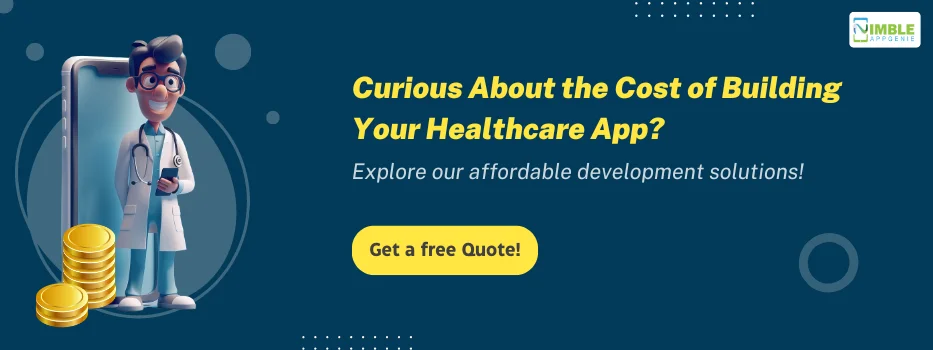




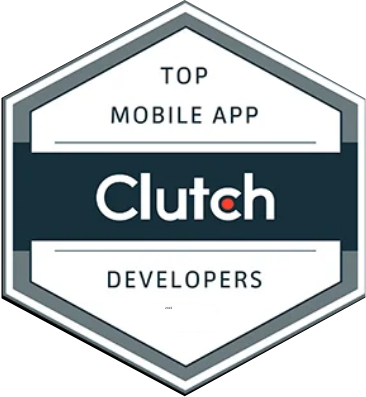
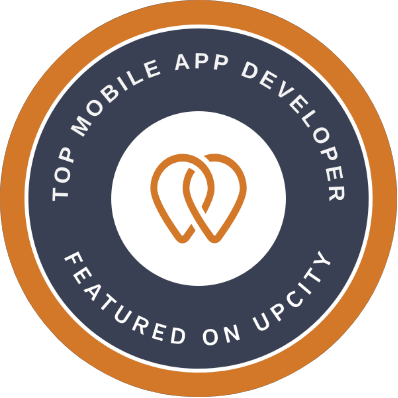
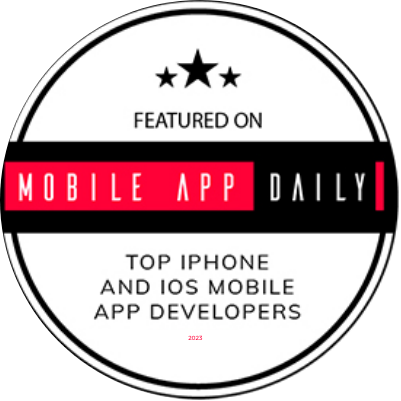
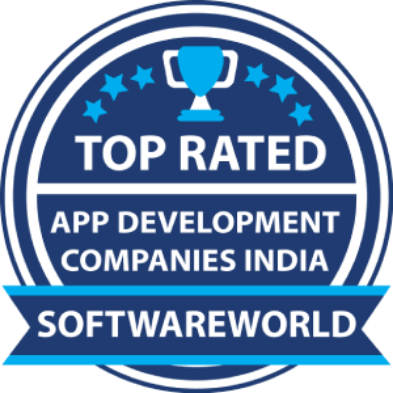
No Comments
Comments are closed.